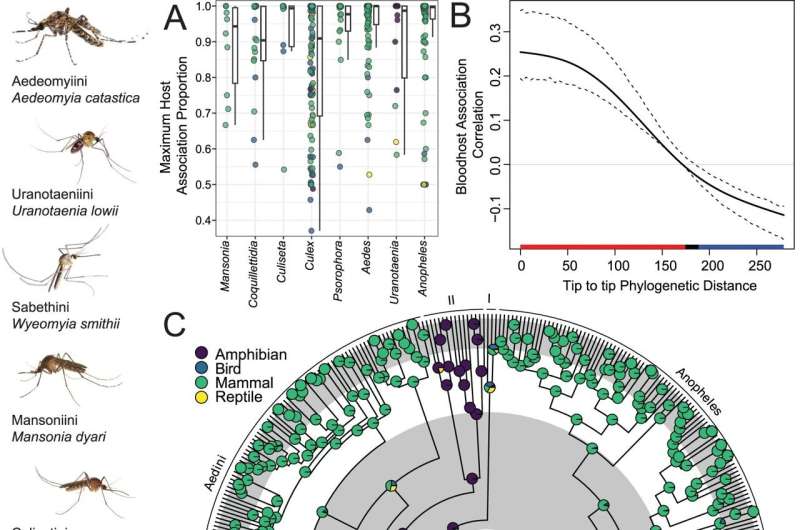This article has been reviewed according to Science X's editorial process and policies. Editors have highlighted the following attributes while ensuring the content's credibility:
fact-checked
peer-reviewed publication
trusted source
proofread
Study elucidates evolution of mosquitoes and their hosts

Researchers at North Carolina State University and global collaborators have mapped the mosquito's tree of life, a major step toward understanding important traits, such as how the insects choose their hosts, feed on blood and spread disease. The findings will help researchers make better predictions to model disease transmission and understand what makes some mosquitoes better disease carriers than others.
The research suggests that mosquito evolution over the past 200 million years mirrors the Earth's history of shifting land masses and changing host organisms, says Dr. Brian Wiegmann, William Neal Reynolds Professor of Entomology at NC State and corresponding author of a paper describing the mosquito family tree, published in Nature Communications.
"This ongoing project builds a big-data resource that mines the academic literature with published observations of the sources of blood mosquitoes drink, from animals as diverse as fish to humans," Wiegmann said. "It focuses explicitly on data collection to infer aspects of mosquito biology in a contextualized way. That means linking up the family, or phylogenetic, tree with the narrative of life on Earth: geologic history, climate history and organism history."
While the researchers pored over the academic literature to capture as much published information about mosquitoes as possible, new genomic sequencing techniques also allowed them to take decades-old mosquitoes—some held in place by pins inside insect collections—and capture a great deal of information on their genetic similarities from just fragments of their genetic blueprints, or genomes.
"A lot of research goes into the important mosquitoes and there's not much known about the incredible mosquito diversity across the globe," Wiegmann said. "We now have the tools to sample genetic information more rapidly and very thoroughly. And so the time was right to take a big stab at putting the disease vectors and the well-known mosquitoes into the context they evolved in."
Piecing the genetic and published information together gave the researchers a few notable findings and these can be evaluated against current patterns and distributions.
Mosquitoes are an ancient group—around 217 million years old—that probably originated in South America before it was South America, on one big land mass called Gondwana that hadn't yet split apart.
"Major events like continental drift certainly influenced the diversification of mosquitoes," Wiegmann said.
"The genomic data confirms that blood feeding evolved very early, before some vertebrate groups, like mammals and birds, were flourishing on Earth," Wiegmann said. "Mosquitoes evolved right along with them with a new feeding strategy of developing hypodermic needles for mouths and feeding on blood in order for females to have plenty of protein to develop mature eggs."
And while no mosquito gut contents exist from hundreds of millions of years ago, Wiegmann says that dinosaurs likely provided blood meals for mosquitoes.
"Before mammals became the main hosts on Earth, there had to be something else that mosquitoes fed on. Our research suggests that mosquitoes started out feeding on amphibians and then moved onto other groups—reptiles and birds—as those groups flourished during the Jurassic Era between about 200 million and 145 million years ago."
Wiegmann said work on the mosquito family tree will continue.
"The family tree ends up being a road map for the kinds of adaptations that led to why some mosquitoes are such important vectors of disease and others are not," Wiegmann said. "If we figure out which are the bad mosquitoes and put them in the context that led to the success of being vectors of human disease, then we can understand more about how similar pathways may be taken, or how we can predict why some mosquitoes are carriers of viruses and other are not."
More information: John Soghigian et al, Phylogenomics reveals the history of host use in mosquitoes, Nature Communications (2023). DOI: 10.1038/s41467-023-41764-y
Journal information: Nature Communications
Provided by North Carolina State University





















